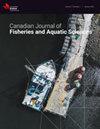Developing management plans for sprat (Sprattus sprattus) in the Celtic Sea to advance the ecosystem approach to fisheries
IF 2.2
2区 农林科学
Q2 FISHERIES
Canadian Journal of Fisheries and Aquatic Sciences
Pub Date : 2024-05-31
DOI:10.1139/cjfas-2023-0090
引用次数: 0
Abstract
Canadian Journal of Fisheries and Aquatic Sciences, Ahead of Print.Sprat are commercially valuable and are an important component of the North-East Atlantic ecosystem as major predators of zooplankton, competitors with herring, and prey for piscivorous fish, marine mammals, and seabirds. Despite this, insufficient information exists for Celtic Seas sprat, one of five North-East Atlantic stocks, to estimate stock status. To ensure the sustainable exploitation of sprat, the health of the Celtic Seas ecosystem, and the wider fisheries sector, we conduct a management strategy evaluation to stress test the current single-species advice framework. The aim is to evaluate whether ecosystem objectives can be achieved under single-species maximum sustainable yield and precautionary advice frameworks. An operating model was conditioned on life history theory and strategic information from ecosystem models. We showed that in-year advice using an empirical rule could achieve management objectives and help balance the trade-offs between fishing activities and ecosystem health. The approach allows ecosystem understanding to be incorporated within existing precautionary and maximum sustainable yield frameworks to provide a robust management framework that can meet multiple objectives despite uncertainty.
制定凯尔特海鲱鱼(Sprattus sprattus)管理计划,推进渔业生态系统方法
加拿大渔业和水产科学杂志》,提前印刷。 鲱鱼具有商业价值,是东北大西洋生态系统的重要组成部分,是浮游动物的主要捕食者、鲱鱼的竞争者以及食鱼类、海洋哺乳动物和海鸟的猎物。尽管如此,作为东北大西洋五个种群之一的凯尔特海鲱的信息仍不足以估计种群状况。为确保鲱鱼的可持续开发、凯尔特海生态系统的健康以及更广泛的渔业部门,我们开展了一项管理策略评估,对当前的单一物种建议框架进行压力测试。目的是评估在单一物种最大持续产量和预防性建议框架下是否能实现生态系统目标。运行模型以生命史理论和生态系统模型的战略信息为条件。我们的研究表明,使用经验规则的年内建议可实现管理目标,并有助于平衡渔业活动与生态系统健康之间的权衡。该方法可将对生态系统的理解纳入现有的预防性和最大可持续产量框架,从而提供一个稳健的管理框架,在不确定的情况下实现多重目标。
本文章由计算机程序翻译,如有差异,请以英文原文为准。
求助全文
约1分钟内获得全文
求助全文
来源期刊

Canadian Journal of Fisheries and Aquatic Sciences
农林科学-海洋与淡水生物学
CiteScore
4.60
自引率
12.50%
发文量
148
审稿时长
6-16 weeks
期刊介绍:
The Canadian Journal of Fisheries and Aquatic Sciences is the primary publishing vehicle for the multidisciplinary field of aquatic sciences. It publishes perspectives (syntheses, critiques, and re-evaluations), discussions (comments and replies), articles, and rapid communications, relating to current research on -omics, cells, organisms, populations, ecosystems, or processes that affect aquatic systems. The journal seeks to amplify, modify, question, or redirect accumulated knowledge in the field of fisheries and aquatic science.
 求助内容:
求助内容: 应助结果提醒方式:
应助结果提醒方式:


